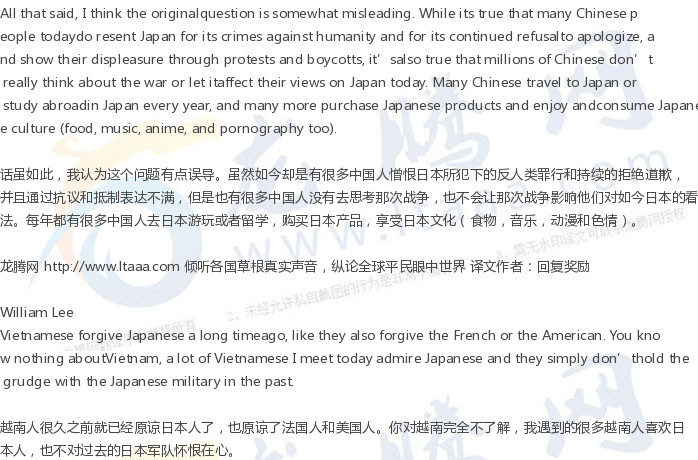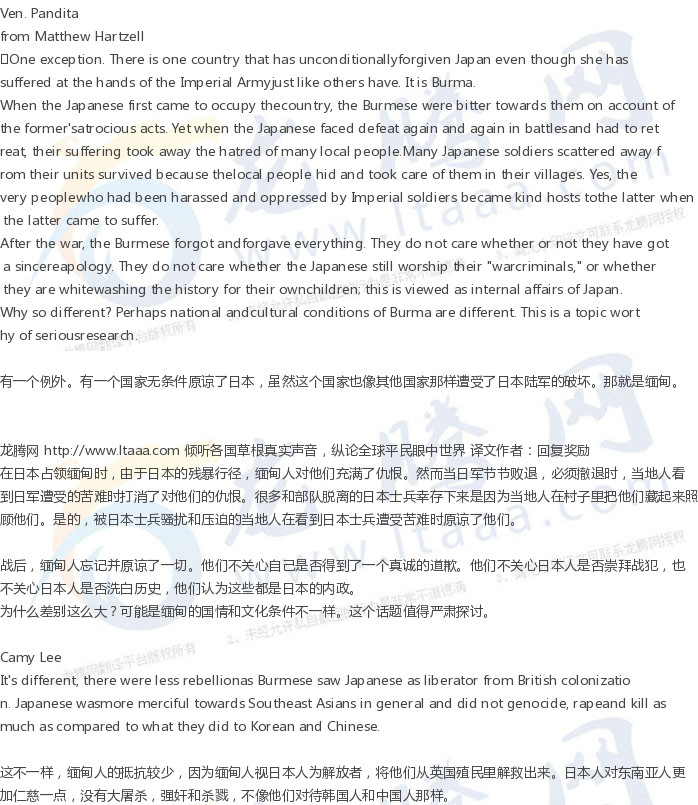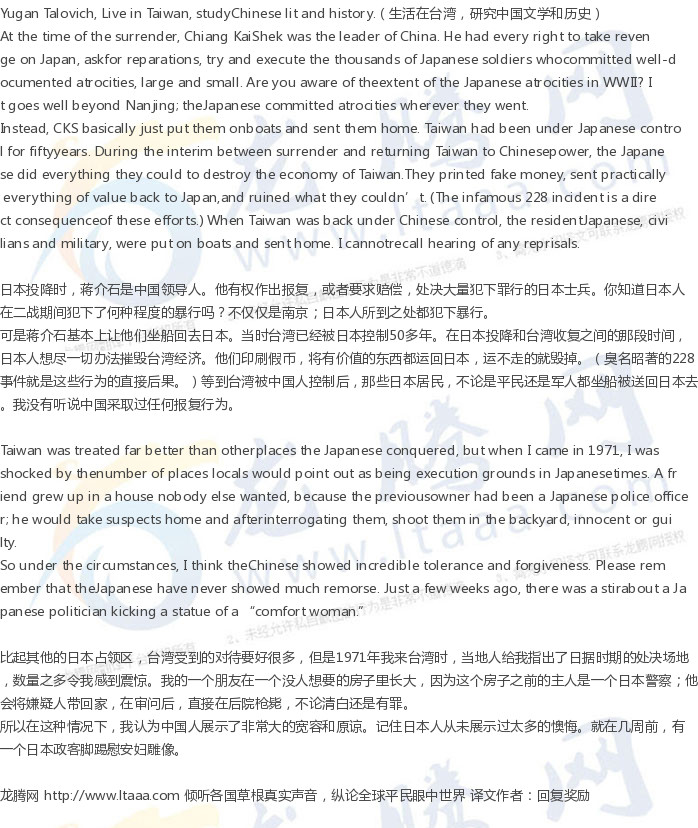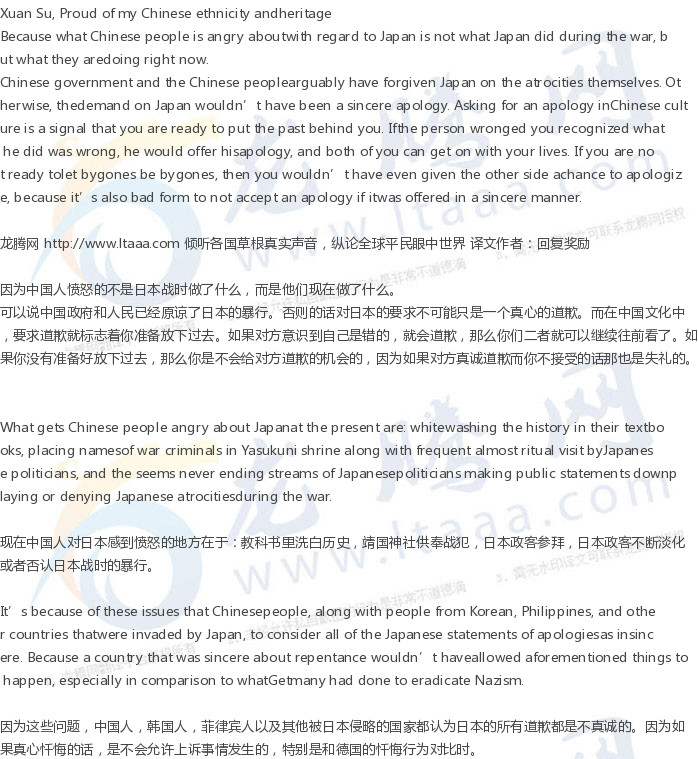中国素有宽容的传统,却为什么不原谅日本人呢? [美国媒体]
quora网友:因为中国(还有韩国,以及世界上所有被日本占领,性侵和杀害的人们)还在等待一个真诚的道歉。直到今天,日本继续尊奉其战犯,否认以“慰安妇”之名强迫数百万中国和朝鲜妇女当性奴之实,而且在其历史教科书里洗白历史......
Why don't Chinese forgive Japanese while China has the tradition of tolerance?
中国素有宽容的传统,却为什么不原谅日本人呢?
Matthew Hartzell, Lived in China from2009-2015, 知乎大V
Because China (as well as Korea, and everyother nation whose people were subjugated, sexually assaulted, and murdered byJapan) is still waiting for a sincere apology.
To this day, Japan continues to venerateits war criminals, deny the truth that millions of Chinese and Korean womenwere made sex slaves under the euphemism “comfort women,” and teach itschildren a whitewashed version of history.
If I were Chinese, I wouldn’t blamecontemporary Japanese people for a war that most of them were not yet alive tosee, let alone fight in. I would, however blame Japan for failing to publiclyreckon with its recent past.
As a counterpoint, I would never “forgive”Nazi Germany for its crimes against humanity, but I appreciate the way thatGermany has acknowledged its demons, how German schools teach the Holocaust asit actually happened, and the lengths to which Germany has gone to make surethat history is never repeated.
因为中国(还有韩国,以及世界上所有被日本占领,性侵和杀害的人们)还在等待一个真诚的道歉。
直到今天,日本继续尊奉其战犯,否认以“慰安妇”之名强迫数百万中国和朝鲜妇女当性奴之实,而且在其历史教科书里洗白历史。
如果我是中国人,我不会指责当代的日本人,毕竟战争发生之时他们可能还没出生,更别提参与其中了。但是我会谴责日本在处理历史问题上的不作为。
就好比我永远不会“原谅”纳粹德国所犯下的反人类罪,但是我欣赏德国人承认自己罪行的方式,德国学校里如实的教授大屠杀事实,还有德国作出了一系列努力确保历史不会重演。
Matthew Hartzell
from William Lee
If you look at what I actually wrote,you’ll see that I never wrote that “Vietnamese haven’t forgiven Japan.” Thequestion was about China. My answer was about China. What I wrote was thatChina (as well as other Asian countries) are “still waiting for an apology”.Waiting for an apology is not the same thing as “not forgiving”. Originally, Iwas only going to write the words Koreans because the Koreans and Chinesesuffered the most under the Japanese, but then I added Philippines and Vietnambecause I wanted to be more inclusive. Based on your response, it looks likeI’d have been better off leaving Vietnam out of it. I meant no disrespect, bythe way. Nor did I ever imply that I thought Vietnamese have a grudge. I’vebeen to Vietnam many times, love the country, and the people. Cheers.
我根本没有说越南人没有原谅日本。这个问题问的是中国。我的回答和中国相关。我写道中国以及其他亚洲国家依然在等待道歉。等待道歉不等于不原谅。我原先只想说韩国人,因为韩国和中国遭受了日本最大的伤害,但是我又增加了菲律宾和越南,因为我想更加具体点。根据你的反应,看来我不提越南会更好。反正我没有恶意,我也没暗示越南怀恨在心。我去过越南很多次,喜欢这个国家及其人民。
William Lee
Thank you. As you said, you should leaveVietnam out of it by deleting “Vietnam” in your post.
谢谢。正如你所言,你不应该提到越南。
Chang-Chi Liu
The title is very misleading. When Japansurrendered in August 1945, there were still millions of Japanese soldiers andcivilians in China, living among 400 million Chinese. They all returned toJapan safely. I did not read any report that avenging Chinese mobs killingJapanese. Chinese who struggled through the war just wanted to forget the painsand build a new life.
这个问题很有误导性。1945年8月日本投降时,有数百万日本士兵和公民在中国,生活在4亿中国人当中。他们都安全回到日本。我没有看到任何报告称普通中国暴徒杀死日本人。经历过战争的中国人只想忘记伤痛,建立新的生活。
Ayu Nita Lutfiani
As An Indonesian i agree to this. Japanesedont teach their younger generation about their ancestor horrible past
作为印尼人,我赞同,日本人没有教育年轻一代他们祖先的可怕历史。
Charlie Pierce
Who said China had a tradition oftolerance?
谁说中国有宽容的传统的?
Joseph Wang, studied at Ph.D Astronomy UTAustin, Physics MIT
Well in Chinese culture in order to beforgiven, you must first ask for forgiveness. You have to apologize andabjectly beg for mercy.
Also once you are forgiven, you are not offthe hook. Even when someone has forgiven you, you are still morally obligatedto seek penance and behave humbly. Your sins may be forgiven, but they are notforgotten.
在中国文化中,要想被原谅,你必须先请求原谅。你必须道歉,乞求宽容。
而且一旦被原谅后,也不意味着你脱身了。即使某人原谅了你,你依然有道德义务寻求忏悔,举止谦卑。你的罪行可能被原谅,但是不会被忘记。
There’s one big difference between Japaneseculture and Chinese culture. In Japanese culture, death brings forgiveness andonce someone dies their sins are erased. In Chinese culture, death is merelythe start of moral judgment.
If you are not willing to give a fullapology and beg for mercy, it’s usually better that you don’t apologize at all.If you don’t apologize because you think you did nothing wrong, people may befurious at you, but they will at least respect you for standing up for yourbeliefs.
If you give a half-apology or an apologythat seems insincere, then you come across as dishonest, and that’s worse thannot apologizing at all.
中日文化之间有一个巨大的差异。在日本文化中,死亡可以带来原谅,某人死后,他的罪恶就消失了。在中国文化中,死亡仅仅是道德评判的开始。
如果你不愿意进行一次全面的道歉并乞求仁慈,那最好还是不要道歉。如果你认为自己没错所以不道歉,人们可能会对你感到愤怒,但是人们至少会尊重你坚持自己的信念。
如果你只是半心半意的道歉,或者道歉不够真诚,那么人们会觉得你不诚实,这比不道歉还糟糕。
this is an ongoing issue, not somethingthat happened long ago. Chinese people can’t forgive, because Japan hasn’tstopped. Only after they make sure all of their textbooks contains an honestportrayal of the war and the atrocities, remove those war criminals from placeof worship, and make laws outlawing denial of war time atrocities, only thencan we talk about forgiveness.
日本一直是这样,所以中国人无法原谅。只有日本教科书里诚实描述战争和暴行,移除神社里的战犯,制定法律将否认战争罪行设为非法后,那时才有原谅可言。
版权声明
我们致力于传递世界各地老百姓最真实、最直接、最详尽的对中国的看法
【版权与免责声明】如发现内容存在版权问题,烦请提供相关信息发邮件,
我们将及时沟通与处理。本站内容除非来源注明五毛网,否则均为网友转载,涉及言论、版权与本站无关。
本文仅代表作者观点,不代表本站立场。
本文来自网络,如有侵权及时联系本网站。
图文文章RECOMMEND
热门文章HOT NEWS
-
1
Why do most people who have a positive view of China have been to ...
- 2
- 3
- 4
- 5
- 6
- 7
- 8
- 9
- 10
推荐文章HOT NEWS
-
1
Why do most people who have a positive view of China have been to ...
- 2
- 3
- 4
- 5
- 6
- 7
- 8
- 9
- 10















